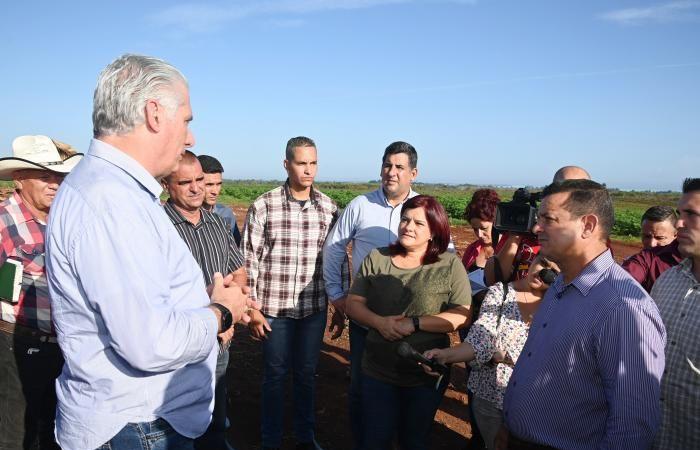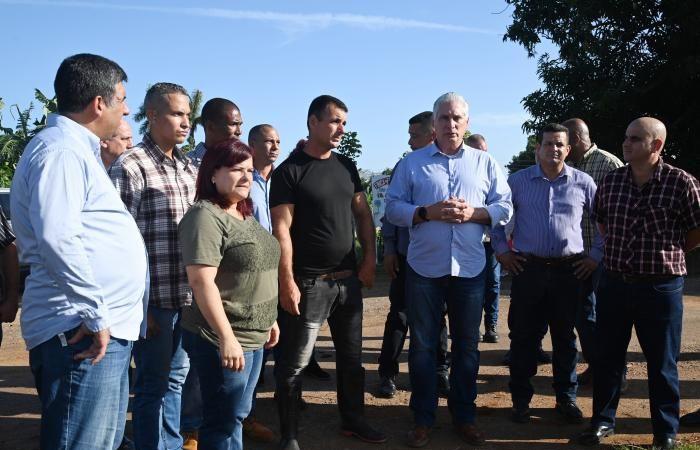LA PALMA, Pinar del Río.- Cleanliness, order, work culture, qualities that despite the current constraints make life more pleasant for people, are attributes of the people of this mostly mountainous municipality that the colleague praised. Díaz-Canel, who on Wednesday morning went to meet more than a hundred palm trees who warmly wrapped him up in front of the parish church of this picturesque town in Vladivostok.
Before starting the necessary dialogue with Party officials, government officials and other leaders of the municipality and the province about what has been done and what to do, the First Secretary of the Central Committee of the Party and President of the Republic gave the locals a recount of the sites visited in this, his sixth visit to Pinar del Río so far this year.
In San Luis, in Consolación del Sur, in Minas de Matahambre, in Sandino, in Viñales and now in La Palma, the leadership of the Party has exchanged in these six months with thousands of returnees – as it has also done in the rest of the territories of the country—in streets, neighborhoods, economic and social entities; in places where there are no good results, in others successful, and in quite a few where the course is straightened and progress begins.
The La Miriam agricultural development zone, former lands of the homonymous UBPC that are now part of a diversification project of several state companies established in the jurisdiction, begins to be palpably inserted into the self-sufficiency program of this municipality, because here, The President would emphasize, there is enough land to guarantee the food of the nearly 34,000 people who live in La Palma.
In 67 hectares of fertile soils, where red ferralitic soils predominate, the La Palma agroforestry company—dedicated to the production and marketing of wood from the forests here and in Viñales—has been exploring various crops such as cassava for almost a year. , banana and corn, both with the labor group that is here full time, and with the company workers, severely limited in their work due to the lack of fuel and lubricants.
The Marbajita agricultural farm, as the venture is called, is becoming a successful alternative for the company, both for self-consumption and to contribute to the municipal self-sufficiency program, in addition to being a key element in allowing the entity to overcome the losses it accumulates, of just over one million pesos, in the coming months, as explained by its general director, Osmel Portales Almora.
Accompanied by Humberto Camilo Hernández, head of the Cadre Policy department of the Central Committee; Yamilé Ramos Cordero, first secretary of the provincial committee of the Party in Pinar del Río; Eumelín González Sánchez, governor of the territory, and the main authorities of the La Palma municipality, Díaz-Canel considered that the La Miriam agricultural project, the umbrella that shelters Marbajita, is a concept created to provide a solution to feeding the people with land and own forces.
“This is the way,” the First Secretary reiterated, although he insisted on working in such a way that there is no turning back, on maintaining everything that is being achieved despite the material limitations. “It is by diversifying productions that we are going to move forward,” he stated, but – he added – “why had we not done this before?”
For self-consumption areas and for municipal self-sufficiency of the La Palma tobacco collection and processing company, the President continued his exchanges, specifically in the fruitbomba plantations of the young user Gustavo Rodríguez Rodríguez, one of the 20 producers who are integrated into the development zone.
The lush fruit trees served as the setting for a dialogue where Diaz-Canel reflected on the need to order the hiring of temporary agricultural personnel, who here are paid, for example, 500 pesos for half a day. Those who work well and hard should earn, but they should also contribute with taxes, something that is not happening, he pointed out, nor are the tenants contributing to the treasury for hiring the workforce, he said.
The La Palma tobacco collection and processing company has accumulated losses of almost 17 million pesos, and expects to close the year with even more unfavorable numbers: 22 million.
The diversification that it is now undertaking in 26 hectares of various crops should allow it to gradually get out of the red numbers, an initiative that Díaz-Canel weighed, although he directed them to carry out a deep economic-financial exercise to find the most appropriate formulas to clean up the your finances.
Díaz-Canel spoke with the inhabitants of the La Ceja community, in the Santos Cruz popular council, about the good example that the La Palma agroforestry is giving with its Marbajita farm and the many pending issues that the tobacco collection and processing company still faces. , where he was expected to greet him, and with whom he reflected on the need for all those who live in these lands to contribute their grain of sand and sweat for the common good.
A neighborhood in transformation, in La Ceja work is being undertaken that has allowed the recovery of social centers affected by the passage of Hurricane Ian in September 2022, such as the primary school and the warehouse, and a good part of the housing stock.
In addition, the reconversion of a location for the family care system (SAF) is carried out, as it is a settlement with many elderly people, and the social circle of the CPA Raúl Sánchez, the axis of economic and social life, is recovered. and cultural of the place.







